In old China, the kowtow was the bow of deep respect, even prostrate obeisance, to the Emperor.
Today, Americans are seeing the distressing spectacle of huge American corporations kowtowing to a new kind of emperor, Xi Jinping, and his Chinese Communist Party (CCP). The most recent flashpoint, of course, has been the self-abasement of the Houston Rockets basketball team.
As Breitbart News put it, the Rockets and the entire National Basketball Association have “caved” to Red China. Indeed, pro basketball is so eager to kowtow to Beijing that it has imported a little bit of Chinese-style totalitarianism to the U.S. Just on Wednesday, basketball authorities engaged in the pettiest possible censorship of its live audience at a game, right before a streaming camera.
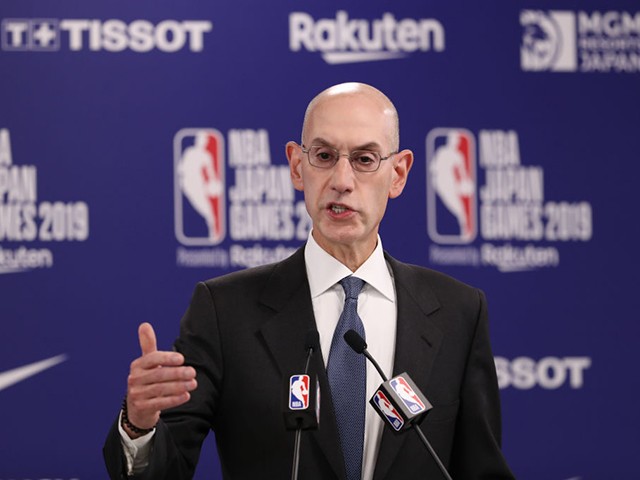
Commissioner of the National Basketball Association Adam Silver speaks during a press conference prior to the preseason game between Houston Rockets and Toronto Raptors at Saitama Super Arena on October 8, 2019. (Takashi Aoyama/Getty Images)
We can leave it to the subversive wits at Babylon Bee to capture the utter craziness of the moment, in which woke corporate values have displaced familiar patriotic values: “NBA Now Requiring All Players To Stand For Chinese National Anthem.”
Of course, it’s not just the NBA; it’s Activision Blizzard, it’s Apple and Google. In fact, Bloomberg News circulated a long list of American companies that have similarly bowed down to China.
So what’s going on? How is it happening that American leading economic players are now taking orders from China? How did “Yankee Imperialism” turn into “Panda Imperialism”?
Once upon a time, there was the hopeful belief that capitalism and free trade would open up China. And yet by now, we’re learned that the Chinese dictatorship hasn’t been opened up by the flow of American money, it’s been empowered by all that cash.
In the words of New York Times columnist Farhad Manjoo, “A darker truth is now dawning on the world: China’s economic miracle hasn’t just failed to liberate Chinese people. It is also now routinely corrupting the rest of us outside of China.”
We might also let Chris Arnade, the ex-Wall Streeter who found his true calling as the photographer/chronicler of gritty “back row” America, tell this sorry tale his way; dripping with scorn for the “front row” of both parties, Arnade tweeted:
For years front row has scolded anyone who disagreed on China, “Actually, trading with China is good. Sure we will lose jobs here, sure they destroy the environment & abuse human rights, but it a necessary step you see. Democracy follows capitalism! Just give them time.”
Democracy hasn’t followed. It has been a classic scam, one front-row elites in both parties use to push policies that screw over the working class, who are “less educated” than them.
Telling them, “Actually this is for the greater good. You can’t see it. But trust us experts.”
As China expert Gordon Chang said on Sirius XM radio’s Breitbart News Tonight, the Chinese government is “weaponizing our companies against us.”
Yet it’s hard to think of a China-watcher who has gone further as a China-critiquer than Matt Stoller, a fellow at the Open Markets Institute, a pro-competition, anti-monopoly think tank in Washington, DC.
Stoller’s normal field is business and economics, and yet the threat from China is so great that he’s been sounding a loud klaxon horn, as he tweeted on October 6:
The aim of the CCP is to dominate the entire world, and to replace liberal norms with authoritarian ones. The time to act is now. We need to stop exporting movies and entertainment to China. We need to ban TikTok and do an emergency build-up of 5G capacity. Now.
We can note that TikTok is a made-in-China social media app. And we might pause to observe that if it’s bad enough that the Silicon Valley tech companies are spying on us, it’s worse when Chinese tech companies are doing the spying. And 5G, of course, is the next-gen wireless network that Huawei would like to own on behalf of its owner, the Chinese government.
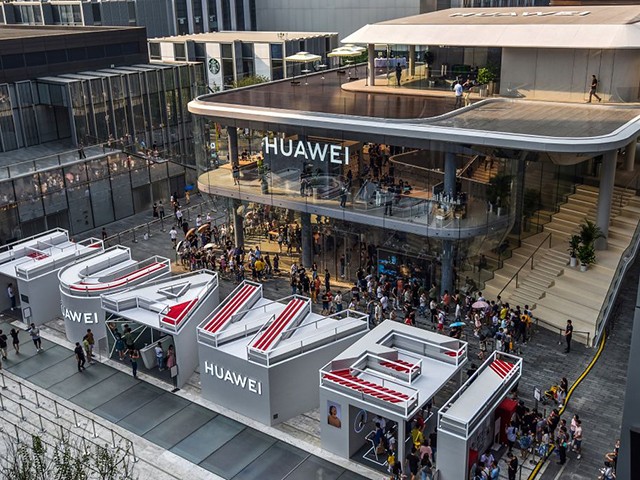
This aerial photo taken on September 28, 2019, shows people visiting a newly-opened Huawei flagship store in Shenzhen in China’s southern Guangdong province. (STR/AFP/Getty Images)
So we can see: On the topic of China, Stoller sounds a lot like, say, Stephen K. Bannon, the former Trump senior adviser who now helps lead The Committee on the Present Danger: China.
Yet interestingly, as he makes the case against kowtowing to China, Stoller seems to have one target above all: Joe Biden.
Red Star Star over Hollywood: Middle-Class Joe and Big Panda
On October 7, in his free e-mail newsletter, BIG, Stoller headlined a piece, “How Joe Biden Empowered China’s Censorship of the NBA.”
Stoller started by describing how the former vice president had helped Hollywood—and here again, as Virgil noted on October 5, the simple facts about Biden have been hiding in plain sight.
So Stoller cranked his wayback machine…not very far at all, merely to May 2, 2014, when the Washington Post ran an article, “How Biden helped Hollywood unlock China.” The piece was positive, of course, focusing on how great it was that the intrepid vice president had persuaded the Chinese to accept more American movies into their home market. Indeed, the article featured a photo of a smiling Biden and a smiling Xi, holding up a t-shirt that read, in English, “Fostering Goodwill Between America & China.” (Hunter Biden, then an active player in Chinese commerce, wasn’t mentioned anywhere in the piece.)
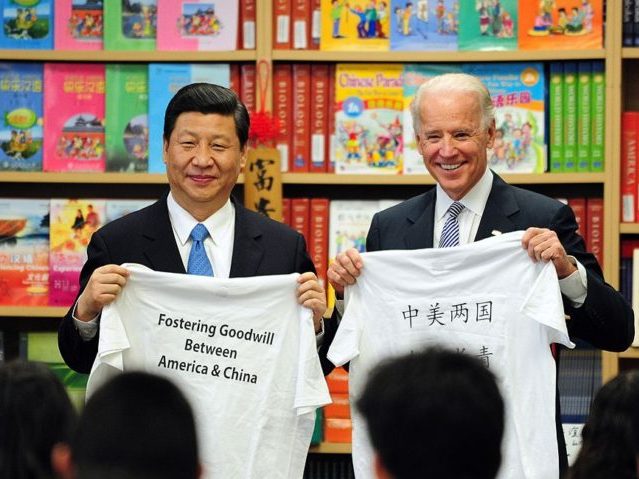
Vice President Joe Biden and his Chinese counterpart Xi Jinping display shirts with a message given to them by students at the International Studies Learning School in Southgate, outside of Los Angeles, on February 17, 2012. (FREDERIC J. BROWN/AFP/Getty Images)
Yet if the Post was happy about Biden’s China-dealing, Stoller is not. As he wrote in his newsletter, “What Biden … didn’t consider was the leverage over studio output that that [sic] increased dependency on the Chinese market gave to the Chinese government.”
In other words, yes, the Chinese agreed to put money in Hollywood’s pocket. And yet at the same time, the Chinese bought influence on Hollywood’s product.
In 2015, the U.S. Government’s Economic and Security Review Commission released a report, the headline of which says it all: “Directed by Hollywood, Edited by China: How China’s Censorship and Influence Affect Films Worldwide.”
Or as Breitbart News’s John Nolte wrote on October 8, the Chinese have been shaping a long list of recent films, including Red Dawn, Gravity, and Top Gun: Maverick. Quoth Nolte: “Hollywood literally sold its artistic soul to the Communist Chinese.”
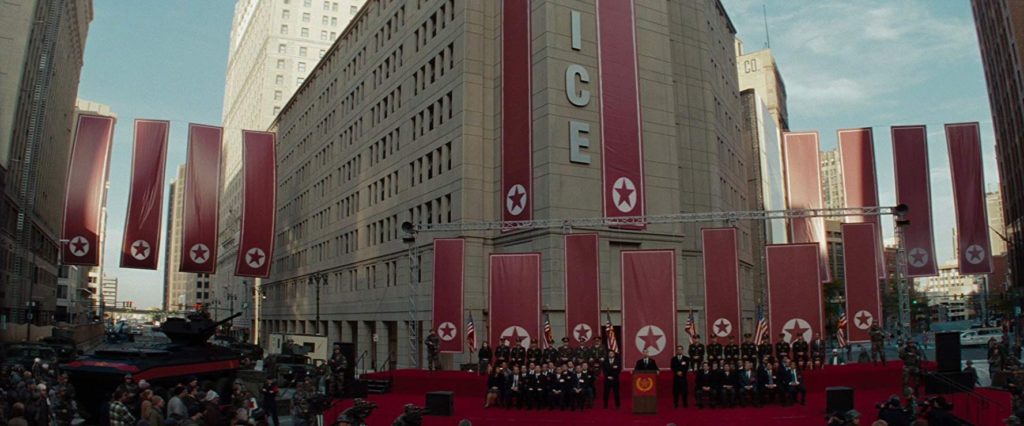
The 2012 Red Dawn remake, which had already been shot, was scrubbed of negative references to the Chinese. (FilmDistrict, Contrafilm, FilmNation Entertainment, 2012)
Speaking of soul-selling, we can add that young Hunter Biden it still active in Chinese business. Just on October 9, three reporters for the Financial Times—one in D.C., one in Beijing, and one in Kiev—teamed up to account for the younger Biden’s business dabblings. And while the reportorial trio could not possibly get to the bottom of everything Hunter has been up to, this much is known:
In addition to his ties to Ukraine through Burisma, the scandal-plagued gas company, and politically connected business ventures in the US, public records show that Hunter Biden still sits on the board of BHR Partners, a private investment fund backed by a number of Chinese state entities including Bank of China, China Postal Savings Bank and China Development Bank.
And the next day, October 10, came this curious headline in the same Financial Times: “Trump adviser says China provided information about Hunter Biden: Michael Pillsbury claims Beijing supplied background on alleged $1.5bn payment.” The article provided few details, so we’ll have to stay tuned on that one; in the meantime, we can observe that $1.5 billion is a lot of money. In fact, Pillsbury seems to have backed away from some of his assertions; no doubt the matter will continue to be sorted out in the days to come.
Yet if we step back from the immediate pushing and pulling of the news and spin cycle, we can see that maybe there’s a reason why Joe Biden has been so dismissive of the economic and strategic threat from China; as he said on May 1, “China is going to eat our lunch? Come on, man. … I mean, you know, they’re not bad folks, folks. But guess what: they’re not competition for us.”
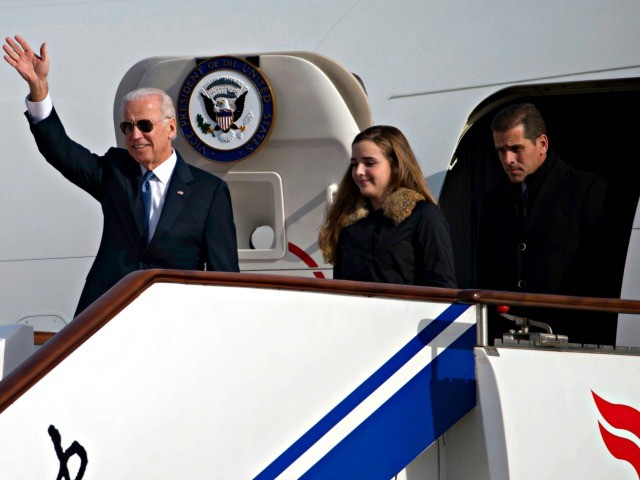
Vice President Joe Biden waves as he exits Air Force Two with his granddaughter Finnegan Biden and son Hunter Biden on an official trip to Beijing, China, on December 4, 2013. Less than two weeks after the trip concluded, Hunter Biden’s private equity firm secured a billion dollar deal with the state-owned Bank of China. (Ng Han Guan-Pool/Getty Images)
Given Joe’s la-de-da attitude, it’s easy to see why Hunter is so popular in China; to the master string-pullers in Beijing, the cultivation of the son seems to be paying off in a large harvest of good will from the father.
So it’s no wonder that Noah Smith, a center-left columnist for Bloomberg News, was moved to tweet on October 8 about the upcoming presidential election, “If I were the Chinese government, I’d definitely be pulling for Biden.”
The Threat from China: We’ve Seen This Before
In addition to his criticism of Biden’s China-chumminess on economic grounds, Stoller sees China as a profound military and ideological threat, of the type we haven’t seen in more than seven decades. As he tweeted on October 7, “China is an expansionist fascist state.” [emphasis added] Adding, “At what point will we wake up?”
Then Stoller went even further, directly comparing the People’s Republic of China to not just fascists, but to actual Nazis—to Hitler’s Third Reich in Germany.
That’s a strong charge, so let’s let Stoller make his case: Returning to the issue of China and Hollywood, Stoller wrote, “In the 1930s, the Nazis sought, through the size of the Germany market, to prevent Hollywood from making movies critical of the Hitler regime, with some success.” In other words, Hollywood was at least partly dissuaded from making anti-Nazi movies.
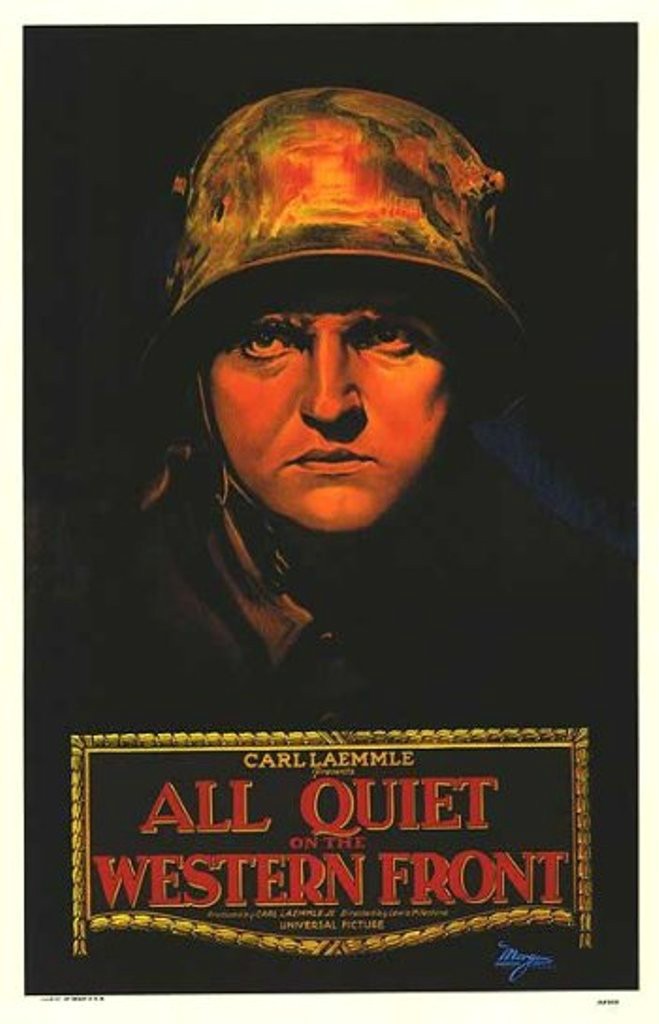
According to The Hollywood Reporter, All Quiet on the Western Front was the first film “to succumb to Nazi pressure after Joseph Goebbels staged a riot during the movie’s Berlin premiere.” (Universal Pictures)
This dark history has been well-recorded; here’s The Hollywood Reporter on July 31, 2013: “The Chilling History of How Hollywood Helped Hitler.” As writer Ben Urwand explained, “The big studios, desperate to protect German business, let Nazis censor scripts, remove credits from Jews, get movies stopped and even force one MGM executive to divorce his Jewish wife.”
Later that year, Urwand published a book from Harvard University Press: The Collaboration: Hollywood’s Pact with Hitler.
Yet as is so often the case, that the facts are there isn’t enough; someone has to come along and connect the dots, turning historical data points into a media-friendly narrative for the present day. And that’s what Stoller has done, by linking Hollywood’s servitude to Hitler in the 1930s to Hollywood’s kowtow to Xi Jinping today.
In fact, Stoller goes even further in his Nazi analogizing, venturing from the glittery world of movie-making to the dead-serious world of munitions-making.
Joined by Lucas Kunce, an ex-Marine, Stoller recently published a long discussion of Nazi efforts to penetrate the U.S. in The American Conservative; the two co-authors detailed Hitler’s determination, in the 1930s, to hollow out our industrial base.

Nazi leader Adolf Hitler is greeted by crowds outside the Siemens-Schuckertwerke factory in Berlin on November 10, 1933. (FPG/Archive Photos/Getty Images)

Chinese leader Xi Jinping waves as he drives after inspecting the troops during a parade to celebrate the 70th Anniversary of the founding of the People’s Republic of China at Tiananmen Square in 1949, on October 1, 2019 in Beijing, China. (Photo by Kevin Frayer/Getty Images)
Perhaps belatedly, the Roosevelt administration was alert to the threat. In 1941, the assistant attorney general for the antitrust division, Norman Littell, delivered a speech entitled, “The German Invasion of American Business.” The Nazis, Littell argued, were using legal techniques—including patent laws, stock ownership, dummy corporations, and cartel arrangements—to extend their power into the U.S. and weaken American industry.
As Littell put it, “The distinction between bombing a vital plant out of existence from an airplane and preventing that plant from coming into existence in the first place [through cartel arrangements] is largely a difference in the amount of noise involved.”
Stoller and Kunce added a fearsome litany of Hitlerian maleficence:
Nazis used their American subsidiary corporations to spy on U.S. industrial capacity and steal technology, such as walkie-talkies, intertank and ground-air radio communication systems, and shortwave sets developed by the U.S. Army and Navy. They used patents or cartel arrangements to restrict the production of stainless steel, tungsten-carbide, and fuel injection equipment. According to the U.S. military after the war, I.G. Farben, the Nazi chemical monopoly, had influence over American production of “synthetic gas and oils, dyestuffs, explosives, synthetic rubber (‘Buna’), menthol, cellophane, and other products,” and sought to keep the United States “entirely dependent” on Germany for certain types of electrical equipment.
If all that industrial skullduggery sounds sort of familiar, that’s because the Chinese have been doing it, too—with the full acquiescence of some recent American presidents. Indeed, just on October 1, Stoller headlined another of his pieces, “How Bill Clinton and American Financiers Armed China.”
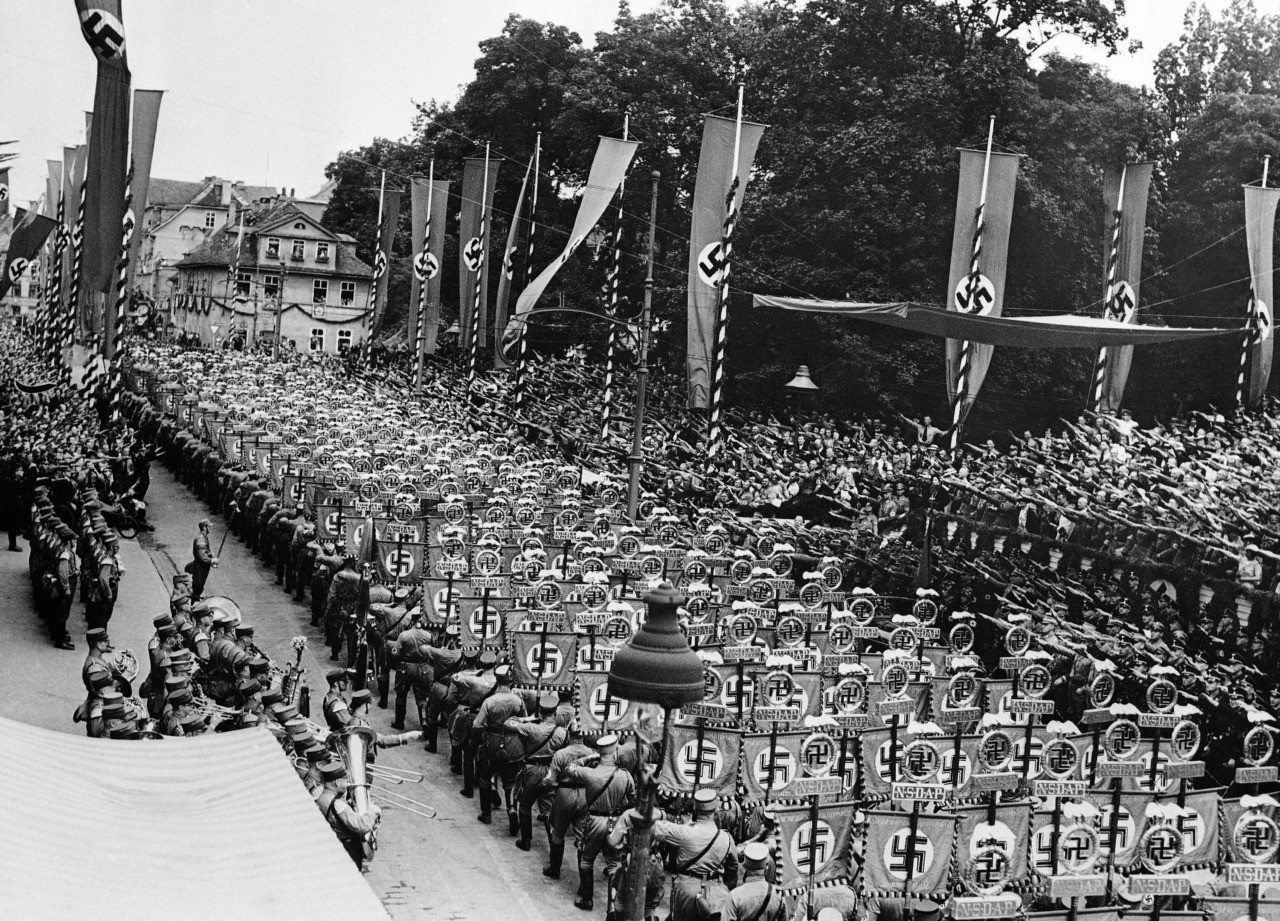
The banners of Hitler’s S.A. parading before Adolf Hitler on the Karlsquare at Weimar on the last day of the Nazi party convention on July 5, 1936. (AP Photo)
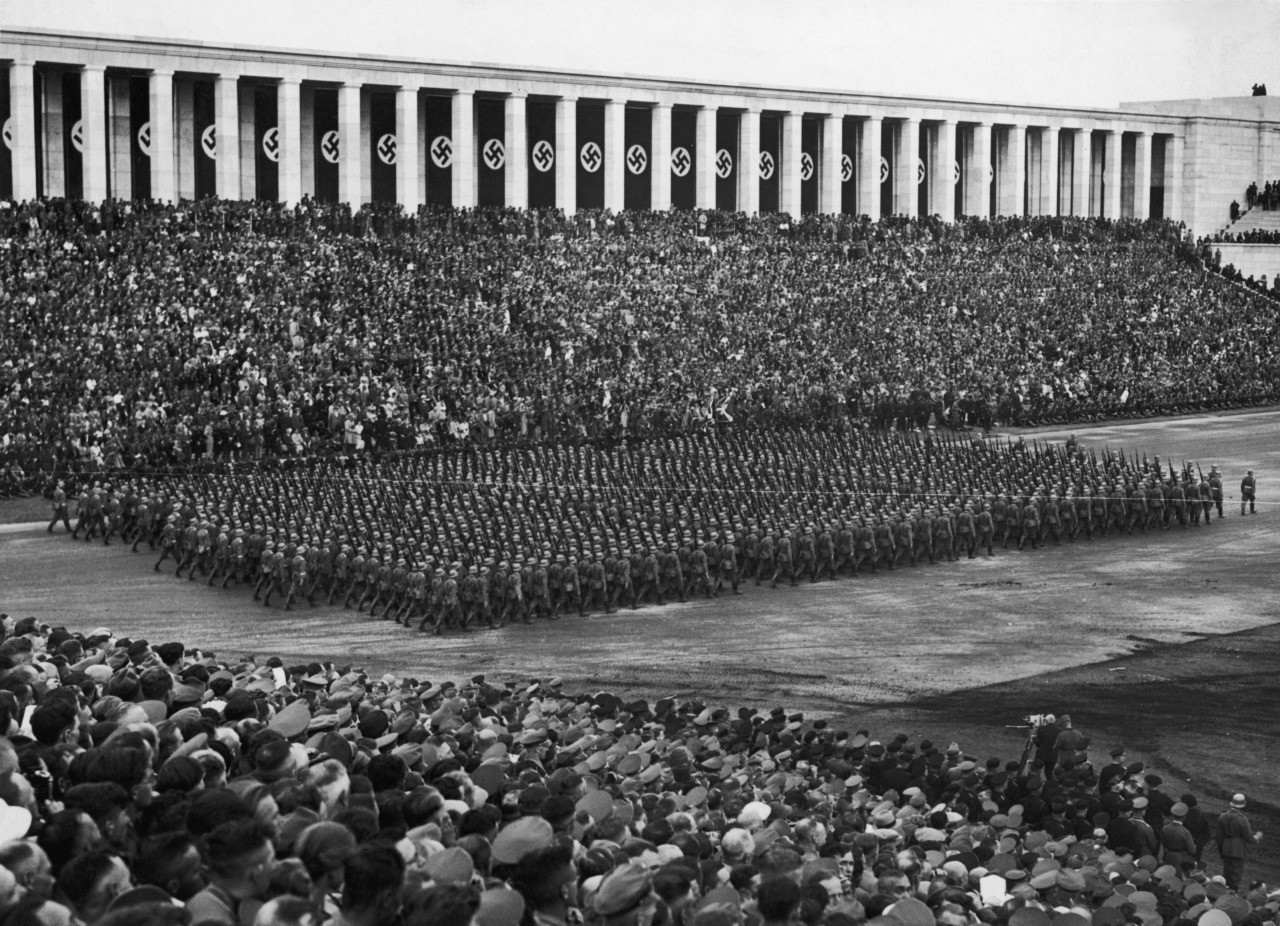
A Nazi military parade by Luftwaffe troops to mark Wehrmacht Day at the Zeppelin Field in Nuremberg, 14 September 1936. (FPG/Hulton Archive/Getty Images)

Nazi leader Adolf Hitler (left) salutes a passing detachment of tanks during a military parade on April 20, 1937, to celebrate his birthday. (AP Photo)
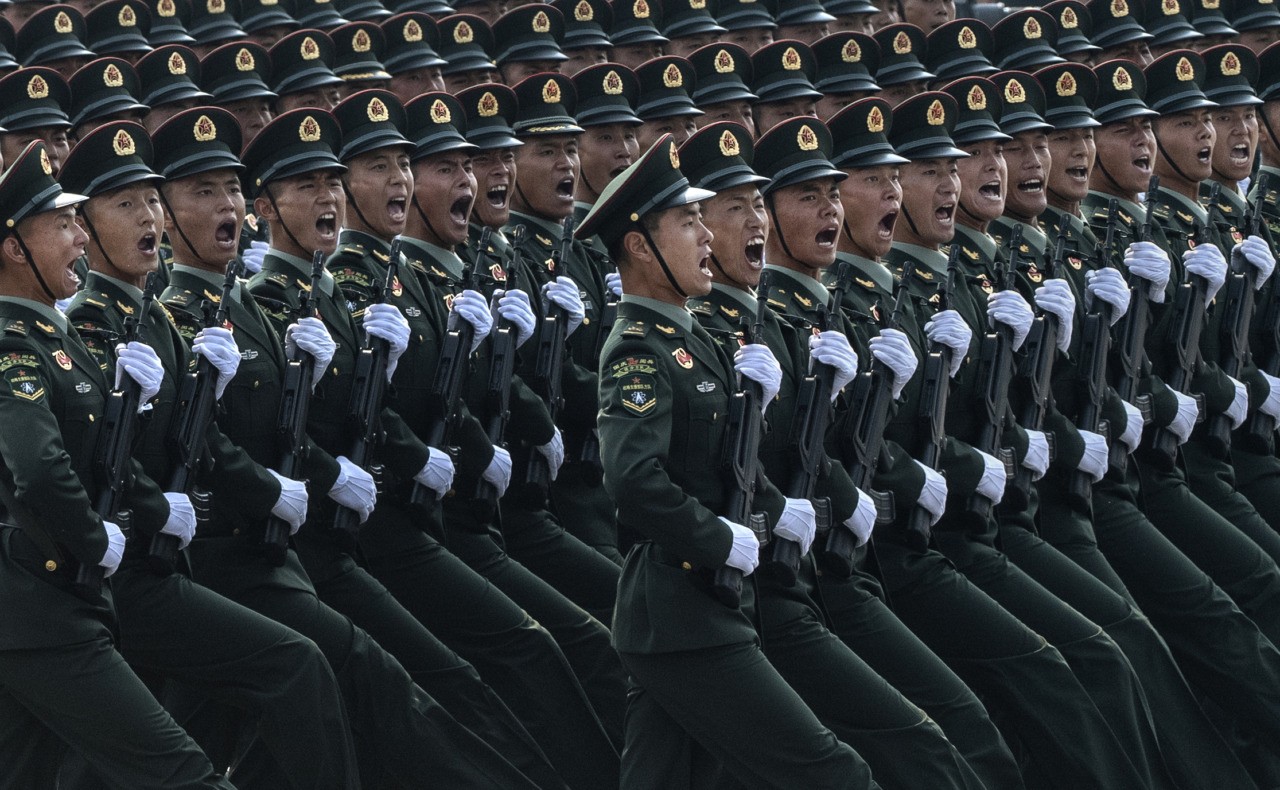
Chinese soldiers shout as they march in formation during the military parade to celebrate the 70th Anniversary of the founding of the People’s Republic of China on October 1, 2019, in Tiananmen Square, Beijing, China. (Kevin Frayer/Getty Images)
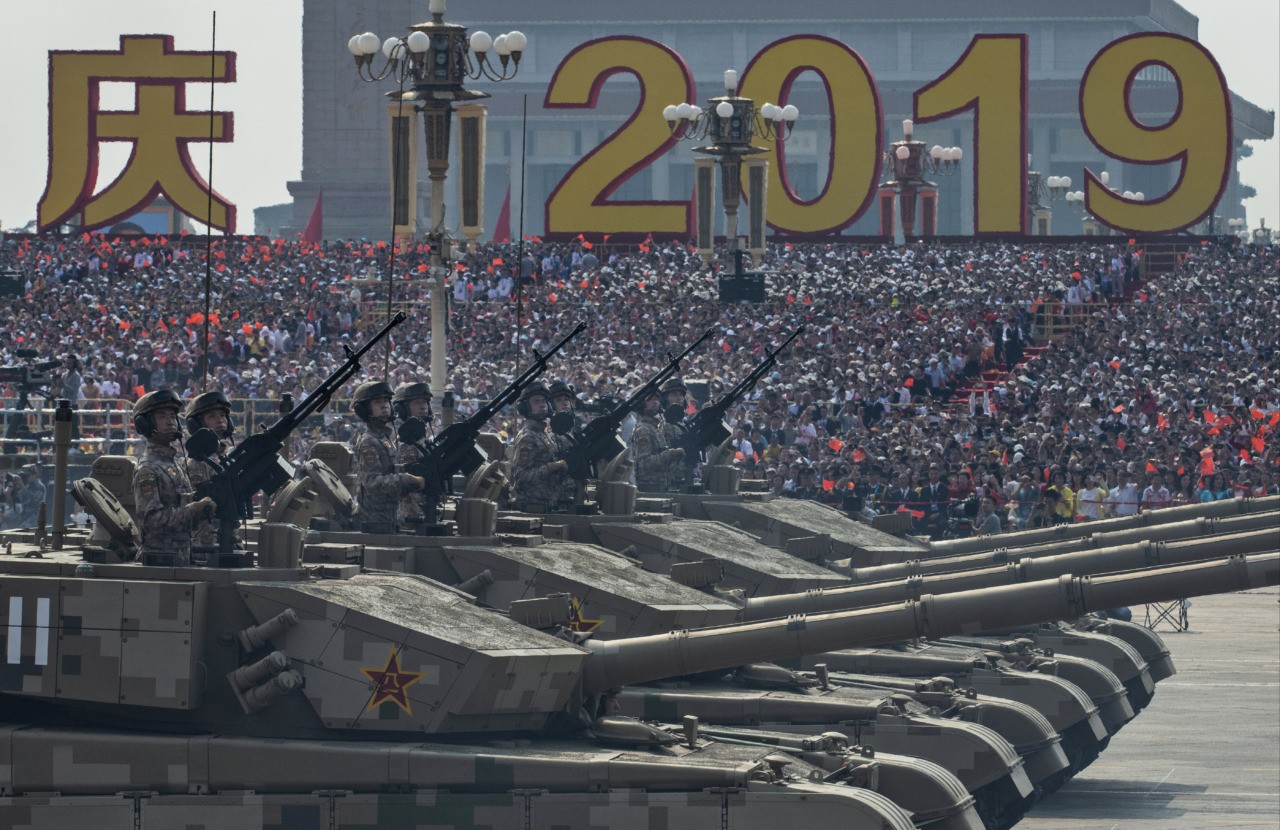
Chinese soldiers sit atop tanks during the PRC’s 70th Anniversary military parade. (Kevin Frayer/Getty Images)
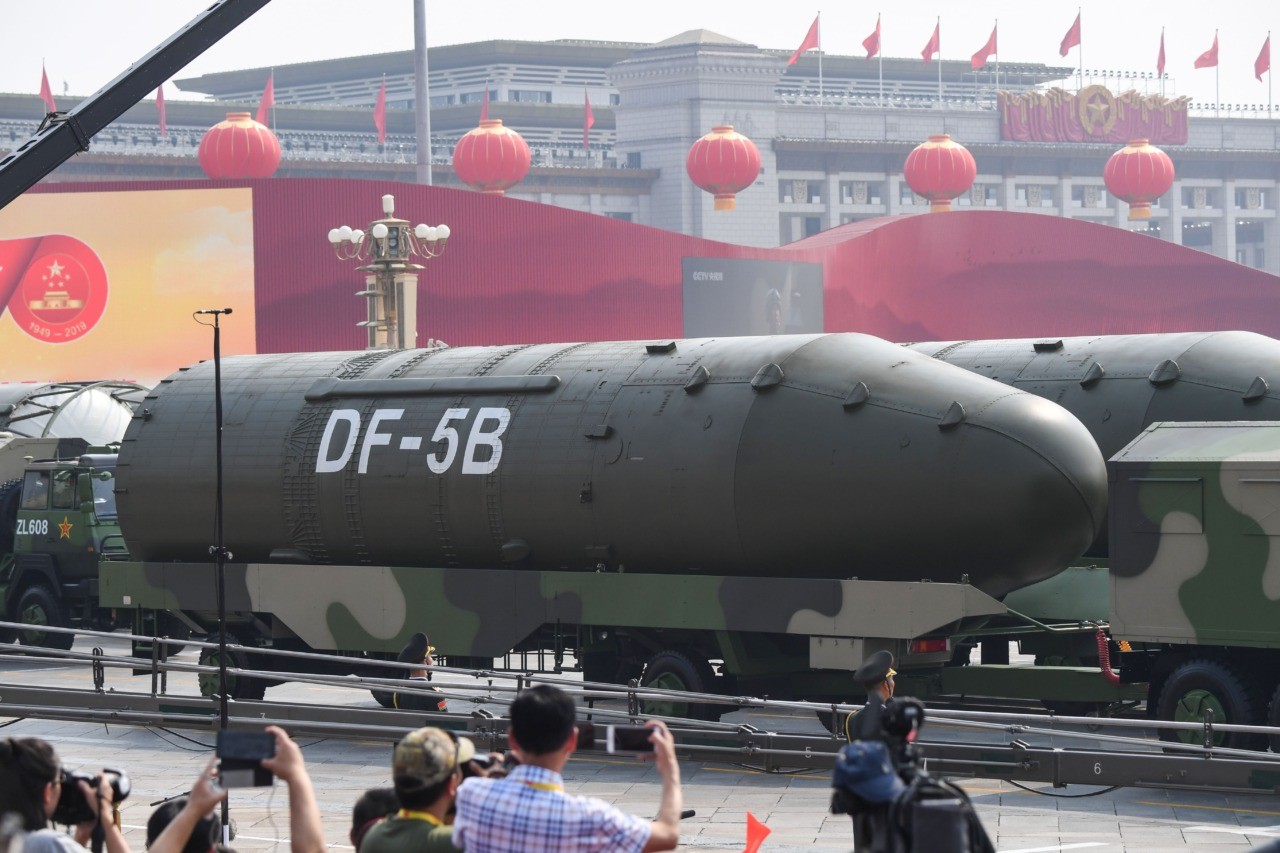
Military vehicles carrying DF-5B intercontinental ballistic missiles displayed during the PRC’s 70th Anniversary military parade. (GREG BAKER/AFP via Getty Images)
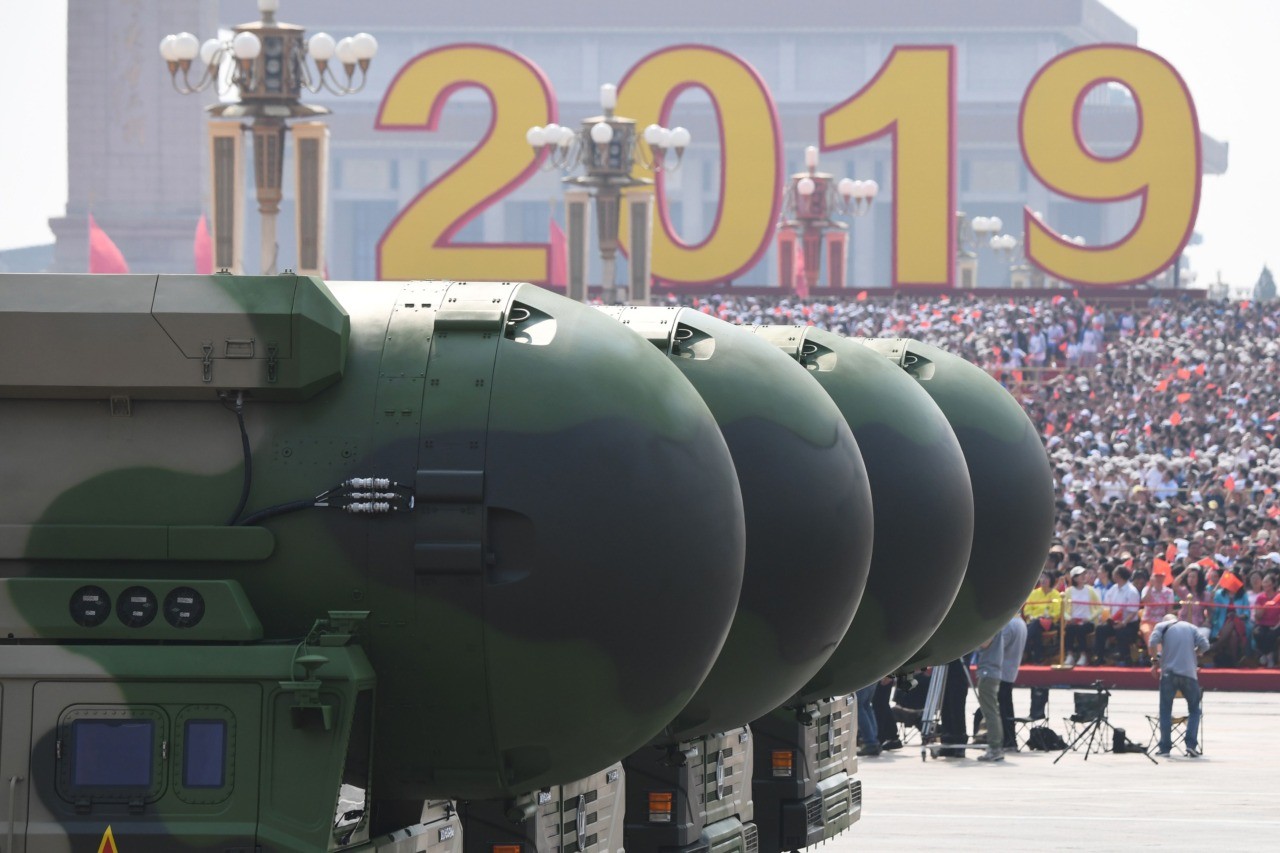
China’s DF-41 nuclear-capable intercontinental ballistic missiles displayed during the PRC’s 70th Anniversary military parade. (GREG BAKER/AFP via Getty Images)
Is America Finally Waking Up?
Although he paints a pessimistic picture of Chinese penetration in the here and now, Stoller is actually optimistic in the longer run. As he puts it, “China’s biggest asset in gaining power was how most people in the West just didn’t realize that the CCP aimed to use it.” He adds, “Now China’s cover is blown.”
Still, Stoller is not complacent; he calls for all-out mobilization:
In the commercial sector, rebuilding the industrial base will require an aggressive national mobilization strategy. This means aggressive investment by government to rebuild manufacturing capacity, selective tariffs to protect against Chinese or foreign predation, regulation to stop financial predation by Wall Street, and anti-monopoly enforcement to block the exploitation of market power.
As it happens, more than two years ago, Virgil declared that the threat from China amounted to a “Sputnik Moment,” requiring just that sort of mobilization. So it’s with a sense of relief that he hears more voices chorusing the same message.
In fact, on October 9, Bloomberg News’s Shawn Donnan described the deterioration of U.S.-Chinese relations, taking note of “how the popular conversation about China is spreading,” then adding, “The moves against Chinese tech companies reflect growing bipartisan anxiety in Washington about China’s crackdown in Xinjiang. But it’s the worsening situation in Hong Kong that is really helping to crystallize things.”
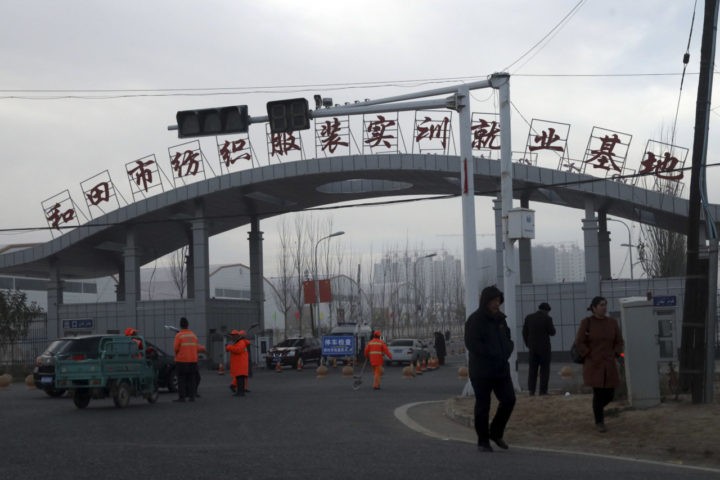
In this December 5, 2018, photo, residents pass by the entrance to the “Hotan City apparel employment training base” where Hetian Taida has a factory in China’s Xinjiang region. This is one of a growing number of internment camps in the Xinjiang region, where as many as one million Uighur Muslims are detained, forced to give up their language and their religion and are subject to political indoctrination. (Ng Han Guan/AP Photo)

Uighur men perform prayers for ancestors at a cemetery before the Corban Festival on September 11, 2016, in the far western Xinjiang province. (Kevin Frayer/Getty Images)

This photo taken on June 4, 2019, shows the Chinese flag behind razor wire at an internment camp in China’s western Xinjiang region. (GREG BAKER/AFP/Getty Images)
Indeed, that same day, the Trump administration blacklisted eight Chinese companies involved in the systemic suppression of the Uyghurs in China’s western Xinjiang province; one might assume that there are a few thousand more such companies involved, but at least it’s a start.
So maybe now is the right time for Americans to take a serious look at retired Air Force Gen. Rob Spalding’s sobering new book, Stealth War: How China Took Over While America’s Elite Slept. Spalding, a former top China strategist at the Pentagon, has been a frequent guest on Breitbart’s Sirius XM show.
Yes, the road ahead is daunting. Yet at least Americans are waking up to the clear and present danger.
Except, of course, for Sleepy Joe Biden, who, as we have seen, has his own family reasons for staying drowsy as the threat from China grows.
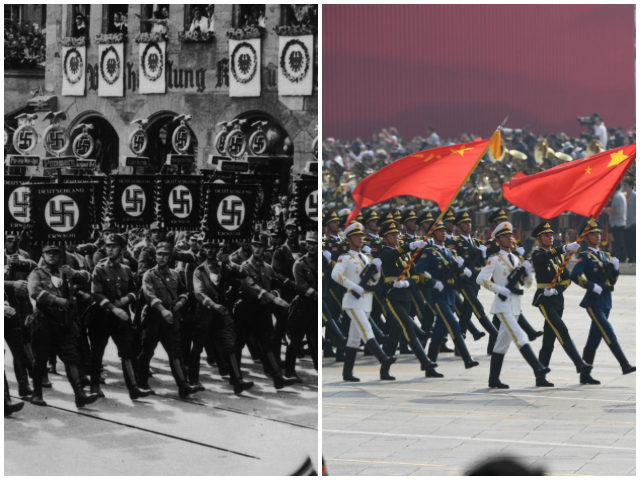
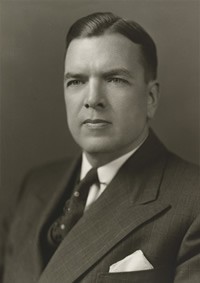
COMMENTS
Please let us know if you're having issues with commenting.